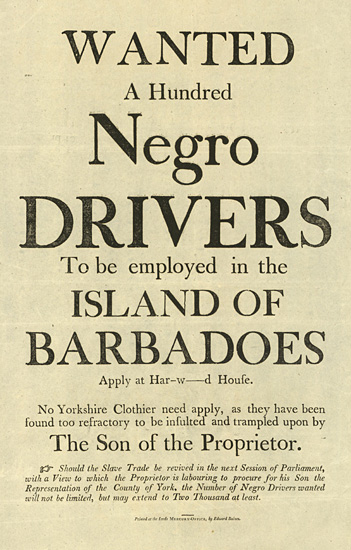In 1627, English colonizers began to settle in Barbados, an eastern Caribbean island, to expand their territory. Their primary reason for coming to Barbados was for planting sugar, so that England might avoid having to buy sugar from other European nations that produced sugar on their own Caribbean islands. The English saw how strong the demand for sugar was. Since sugar cane grew naturally on Barbados, the English saw Barbados as a lucrative opportunity.

However, the Englishmen who wanted to engage in this business had to decide who to send to Barbados to grow, harvest, and process the sugar cane into refined sugar. This was not an easy task, but these Englishmen did have a number of Irish prisoners serving various sentences. They decided on a way for these Irish prisoners to work off their sentences on Barbados sugar plantations. They sent thousands of indentured Irish prisoners to Barbados.1
As the years of growing and exporting this material continued, the English began to think of better ways for the crop to be harvested and exported faster. They needed a higher efficiency route, as well as a way that was cheaper, because the Irish indentured servants did receive some form of salary, even though they were indentured. By the 1670s, African slaves, a cheaper source of labor being used throughout the Caribbean islands, became the alternative to Irish indentured servants. As the English continued to expand their plantations, they began importing African slaves in increasing numbers.2
Between 1627 and 1807, more than 400,000 Africans, mainly originating from West Africa, had been brought to Barbados as slaves to work on sugar plantations. The English planters would request and receive more slaves whenever they believed they needed more for the plantations. The Africans were viewed as nothing more than interchangeable machine parts in the process of sugar production. The treatment experienced by the Africans was among the most inhumane in human history.3
Starting in 1640, Africans were thought of as inferior to Englishmen. Africans were not thought to have the capacity to be intelligent. In consideration of how dark skin color was defined as life of lesser value than light skin color, legal codes naturally evolved out of these attitudes.4

Although the English were continually resupplied with Africans, they felt the need to have restrictions or rules set in motion when it came to controlling the labor of African slaves. The Barbados Slave Code of 1661 created a way for planters to be able to have full capacity to control their slaves by any means they felt necessary without any legal repercussions. The Barbados Slave Code was originally enacted to serve both parties, trying to benefit the slaves and the planters; but it did not go according to plan. Slave owners were to protect their slaves from cruelty:
[N]egroes [are] an heathenish brutish and an unsertaine dangerous kinde of people…yett wee well know by the right rule of reason and order wee are not to leave them to the Arbitrary cruele and outragious wills of every evill disposed person but soo farr to protect them as wee doo many other goods and Chattles and alsoe somewhat farther as being created Men though without the Knowledge of God in the world.5
The slaves did receive one positive from the Barbados Slave Code: the ability to have a change a clothing once a year. The planters, on the other hand, were provided with many new ways to keep their slaves in line. They had the right and the authority to chastise, whip, brand, lacerate, cripple, set them on fire, or murder them with no negative consequences. The reason is during this time the English common Law, which included the right to a jury and judge, was not offered to the Africans, showing that they did not have the same rights as the planters. Africans were unable to be assured any of these statutes if their English masters harmed them in anyway.6
The Barbados Slave Codes began to spread from Barbados to Jamaica, Antigua, and also to South Carolina, where these Codes became the legal basis for slavery and the treatment of slaves in many of the thirteen colonies.7
- Hilary McD. Beckles, “A ‘riotous and Unruly Lot’: Irish Indentured Servants and Freemen in the English West Indies, 1644-1713,” The William and Mary Quarterly 47, no. 4 (1990): 503–7. ↵
- Hilary McD. Beckles, “A ‘riotous and unruly lot’: Irish Indentured Servants and Freemen in the English West Indies, 1644-1713,” The William and Mary Quarterly 47, no. 4 (1990): 505. ↵
- Kenneth Morgan, “Review of Caribbean Exchanges: Slavery and the Transformation of English Society, 1640-1700, by Susan Dwyer Amussen,” The Journal of Modern History 81, no. 3 (2009): 667. ↵
- Kenneth Morgan, “Review of Caribbean Exchanges: Slavery and the Transformation of English Society, 1640-1700, by Susan Dwyer Amussen,” The Journal of Modern History 81, no. 3 (2009): 667. ↵
- Barbados Slave Code of 1661, as quoted in Bradley J. Nicholson, “Legal Borrowing and the Origins of Slave Law in the British Colonies,” The American Journal of Legal History 38, no. 1 (1994): 38–54. Nicholson makes the point that the 1661 Code was only slightly modified in 1676, 1682, and 1688. ↵
- Bradley J. Nicholson, “Legal Borrowing and the Origins of Slave Law in the British Colonies,” The American Journal of Legal History 38, no. 1 (1994): 51. ↵
- M. Eugene Sirmans, “The Legal Status of the Slave in South Carolina, 1670-1740,” The Journal of Southern History 28, no. 4 (1962): 462–73. ↵



51 comments
Damian Jennings
We have all heard the word slavery but when you actually take the time to research and learn about the black culture during this time period, one learns the harsh, cruel, unfair, and dehumanizing life that African Americans were born into; all because of color. My favorite quote was “without any legal repercussions”, there were no laws; they were poorly crafted rules that had a penalty of death to anyone of color. Not much of a choice if you ask me. Aside from my frustration reading about the history, this article provided well-detailed, informative, and eye opening facts.
Cheyanne Redman
To start off, I can’t even begin to fathom treating another human being as a slave, it is crazy to think that you could abuse and own another human being like that. It is sickening to know that this type of treatment still occurs today, and that people are being shipped and sold for money to work. The Barbados Slave Codes were planned to be beneficial for both the slaves and owners yet it just highlighted how terrible they were treated.
Andrew Dominguez
Before this article I’ve never heard of the slave code on Barbados. What I found interesting is the Irishmen were indentured services. What surprised me is they saw slaves as cheaper than irishmen, and they were barely paying the irish anything. Its crazy to think we could control another human like property. These people were stripped away from their homes and families, and had a new life they didn’t ask for.
Regina De La Parra
This is a very well written article that explains a very difficult topic. Every time I read about slavery I just learn more and more about how horrific these times and events African Americans faced. I really enjoyed reading this article because it does a great job explaining the codes and how slaves were treated on those times. Great job Maalik!
Christopher King
I found this very interesting that much of the cruelty and the “official and legal” use of cruelty towards slaves came from the sugar plantations in Barbados. I had always thought it came from the colonies such as Georgia or Virginia. The fact that Irish prisoners that the English imprisoned were able to have wages surprises me because of the relationship of the two throughout history. The decision to bring in slaves to do this hard work for very cheap labor would have concequences a few hundred years from then.
Caroline Bush
Interesting article! Until reading this article I had never heard about the Barbados slave code. Slavery by nature is such an awful thing but adding in the code where it was legal to do whatever you wanted to your slave and them being allocated clothes only once a year is ten times worse. I can never understand how such horrible things happened in history but I can only hope that in the future we can all treat each other equally and fairly. Overall I really enjoyed this article and can tell it was very well researched.
Fumei P.
Slavery by itself is awful, and it only gets worse. I know that there is still black market slavery such as indentured servants, and human trafficking. If being captured and shipped to an unknown place far away from your family against your will isn’t enough, there’s the Barbados slave codes which allocated new clothing once a year, but made it legal for you to beat, cripple, burn and kill your charges. It’s hard for me to understand how humans could treat each other this way.
Tyler Thompson
These slave codes were crazy and in most ways cruel. When slavery is heard, it’s typical for what you would think. They are given such a horrible image, and they were treated just as bad. The most beneficial thing for them was the ability right for new clothes, but they were still tortured at times, when the masters felt necessary.
Maria Esquivel
“The ability to have a change in clothing once a year” was seen as a good thing for them but the fact that the planters had the authority to murder them is truly crazy. Also, it’s bizarre to think that the Irish were getting some type of salary but the African’s weren’t. This was a well detailed article and I never imagined how much control the planters had over these individuals.
Angela Rodriguez
It is truly astonishing to see how much control these slave owners had. The Barbados Slave Codes was yet another great example of one of the ways they abused slaves to grow a business and make a profit. It’s sad to find that these 400,000 human beings were never given the opportunity to make something of themselves outside of being a slave.